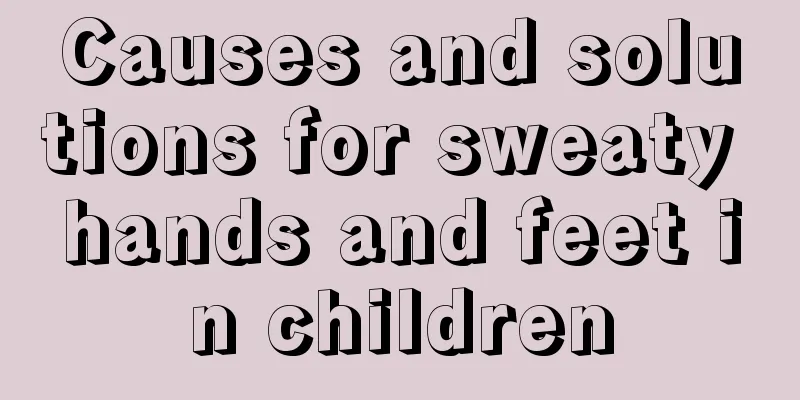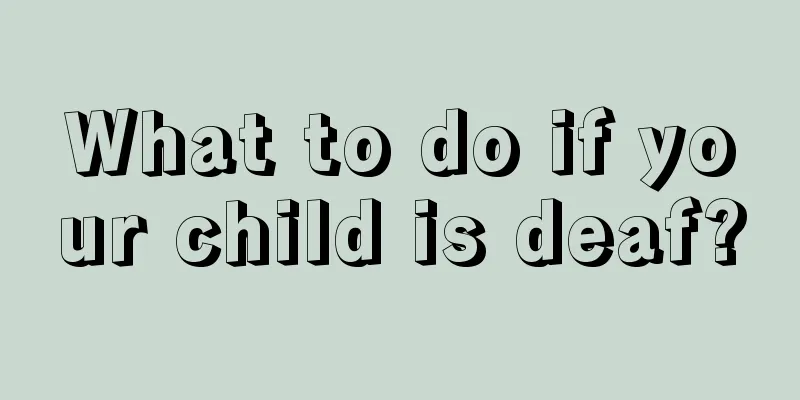Causes and solutions for sweaty hands and feet in children

|
What should I do if my child’s hands and feet sweat? In daily life outside, we often see many children with a towel draped over their backs. Why is that? Children love to sweat, so this is prepared by parents to help them wipe away the sweat. Children often have sweaty hands and feet. Every time you hold their hands, they feel wet. When you ask their parents what is going on, they basically don't take it seriously and just give a general explanation that children just sweat a lot. In fact, it is wrong for parents to have such thoughts. In addition to children's physiological sweating, there are other physical conditions that can also cause children's hands and feet to sweat. So what are the causes and countermeasures of children's sweating hands and feet? 1. Physiological sweating Sweating is a kind of nerve reflex in the body. Because babies are in the stage of growth and development, their physiological metabolism is vigorous and the regulatory function of the nervous system is not very sound, so they sweat a lot. This is medically called physiological hyperhidrosis. Babies with this kind of physiological hyperhidrosis will sweat more obviously in the following situations, such as in summer, when the baby wears too many or too tight clothes, when the baby is active, when eating hot food, or when the baby is nervous or scared. If your baby has no other abnormal symptoms, that is, it is physiological hyperhidrosis. Such babies sweat a lot, not because of physical weakness. Parents do not need to worry and no special medication is needed. Countermeasures: Parents need to take good care of babies who sweat a lot, including: (1) Babies should drink more water; (2) Cultivate the baby's ability to adapt to the environment in life, such as wearing loose clothes and not using too thick bedding; (3) Change your baby’s clothes frequently, bathe him/her more often, and ensure his/her skin is clean; (4) Pay attention to education and do not spoil the baby. This is not only beneficial to the baby's mental development, but also can accelerate the improvement of the baby's nervous system regulatory function. In addition, babies who sweat excessively for a long time will lose zinc in their sweat, so they need to consciously increase the intake of zinc-rich foods, such as eggs, meat, liver, beans and peanuts, to meet the zinc needs for their growth and development. If your baby shows symptoms such as anorexia, slow weight and height gain, you should see a doctor and use zinc-containing drugs under the doctor's guidance. Generally, zinc gluconate has fewer side effects and is easier for babies to accept. Note that calcium supplements will prevent the absorption of zinc in the intestines; many babies take various calcium supplements preventively, and zinc supplements should be avoided at the same time as calcium supplements. 2. Babies with rickets and excessive sweating In addition to the baby's physiological hyperhidrosis, hyperhidrosis caused by rickets is also a common cause in infants and young children. Infants and young babies need 400~800IU of vitamin D every day. If they do not get enough sunlight and do not supplement vitamin D food in time, they are likely to suffer from vitamin D deficiency. In addition, babies grow and develop rapidly, so vitamin D deficiency will cause rickets. Babies with rickets will show symptoms of irritability, crying, and restless sleep; they will sweat a lot, especially on the head, but it has nothing to do with climate. In addition to excessive sweating, babies with rickets also have skeletal deformities, such as square skull, wide fontanelle, delayed closure; delayed teething, flared ribs, bracelets or anklets, etc. Babies with rickets and excessive sweating need to treat rickets to solve the problem of excessive sweating. Countermeasures: 1. Vitamin D and calcium treatment must be carried out under the guidance of a doctor. After the treatment is completed, measures to prevent rickets can be taken, such as adding foods rich in calcium and vitamin D to the baby, such as egg yolks, animal livers, dairy products, etc.; 2. Make sure your baby gets more sun exposure. Babies under 2 years old need to supplement 400 IU of vitamin D and about 600 mg of calcium every day (pharmacy has vitamin D preparations and calcium preparations specifically for babies) to meet the needs of rapid growth and development. 3. Other care requirements for babies with rickets and hyperhidrosis are the same as those for babies with physiological hyperhidrosis. 3. Hyperhidrotic babies who need special attention Physiological hyperhidrosis and rickets-related hyperhidrosis are the most common in infants and young children, but there are some rare conditions, such as tuberculosis, chronic infection lesions, parasitic infections, anemia, hyperthyroidism, and even tumors. Hyperhidrosis is a concomitant manifestation of these diseases and parents should pay attention to them. In addition to hyperhidrosis, babies with the disease may also have low-grade fever, weight loss or emaciation, sallow complexion, rash and other manifestations. If parents find any of these symptoms in babies with hyperhidrosis, they should take their babies to see a doctor in time to avoid delaying diagnosis and treatment of the disease. The following are the causes and countermeasures of sweating hands and feet in children. Therefore, in daily life, if your child loves to sweat, you must take him to a regular hospital to understand the cause of sweating, and then treat it symptomatically, so that the effect of the treatment will be more significant. In normal times, let your children bask in the sun more often to supplement the necessary vitamins and substances, prevent them from being picky eaters, and let them eat more fruits and vegetables. Only in this way can the problem of children sweating be solved. |
<<: Treatment and care of baby ADHD
>>: What causes hunger diarrhea in infants?
Recommend
The reason why baby's nails are turned outward
In fact, there are many issues that need to be pa...
Why do children sneeze frequently?
Many mothers worry that their children will get s...
What to do if a child swallows gum?
It is not uncommon for children to swallow chewin...
What to do if your child has chest tightness, cough and no phlegm
Cough, I believe everyone has experienced this di...
When should children's supernumerary teeth be extracted?
Dental health is a very important matter. Many pe...
How to treat blisters on baby's hands
Many of our children have blisters on their hands...
How to supplement children's iron deficiency anemia?
Iron deficiency anemia is also a very common dise...
What should I do if my child’s skin is burned?
It has to be said that some parents are really ca...
How to treat rashes in infants
Parents are more worried about rashes in young ch...
What to do if your baby has high muscle tension in his limbs
Every baby is the continuation of the lives of hi...
Tips for removing baby's earwax, parents should pay attention
Earwax is a kind of secretion from the ear canal....
Is it okay to use baby enema?
The baby's body is very weak, and parents wil...
How to do tear duct flushing for babies
Nowadays, every baby will undergo some correspond...
7-year-old girl's underwear is a little yellow
Women often have some problems in their bodies, i...
What can students eat to help them with poor memory?
If students have poor memory, it will affect thei...









